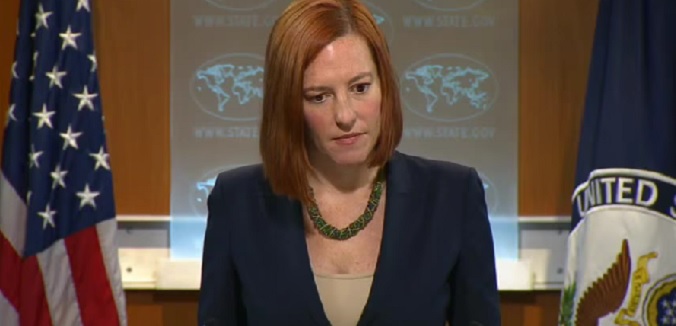Deepening concerns that Monday’s newly announced Palestinian unity government locks in a “Hezbollah model” for any future Palestinian state – a dynamic that has among other things proven terminal to Lebanese efforts to create robust political institutions – made their way into the day’s State Department briefing:
QUESTION: The – Hamas is not apparently dismantling its military infrastructure and its forces, and is the State Department concerned that this is going to create a situation in Gaza similar to the Hezbollah entity in Lebanon?
MS. PSAKI: Well, I think, again, we’ll continue to evaluate the specifics here. But President Abbas has consistently upheld his responsibility to maintain security coordination, and he’s publicly stressed his commitment to doing that. We expect him to continue to uphold that commitment. Beyond that, I don’t have anything else to read out for you today.
QUESTION: So if there’s rocket attacks or terror attacks from Gaza now going forward, will that be under the Palestinian Authority’s responsibility?
MS. PSAKI: Well, we condemn all rocket attacks from Gaza. We would also expect President Abbas to do so as he has in the past, and we expect the Palestinian Authority to do everything in its power to prevent attacks from Gaza into Israel. But we recognize that Hamas currently controls Gaza, and we’ll be closely monitoring the security situation moving forward.
The references are to the terms of the unity pact, hammered out between the rival Fatah and Hamas factions, under which Hamas is allowed to maintain its forces and tens of thousands of Iran-supplied missiles independent of any central Palestinian government.
Officials from the terror group had already bragged last week that the unity pact had established for them the same arrangement that allows Hezbollah to dominate Lebanon, a boast that got the attention of both U.S. analysts and Arabic-language journalists [Arabic].
Dr. Kobi Michael, a former deputy director general at Israel’s Ministry of Strategic Affairs, told reporters on a conference call organized by The Israel Project that the arrangement constituted “the Lebanonization of the Palestinian arena.”
Jonathan Schanzer, vice president for research at the Foundation for Defense of Democracies (FDD), unpacked the controversy more extensively:
But the creation of a new government that includes Hamas is fraught with pitfalls. Haaretz reported last month that the Palestinians appear poised to adopt the Lebanon model of allowing a terrorist entity to exist and operate outside of a weak government’s reach. Hamas leaders have made it clear that the group refuses to disband the Izz al-Din al-Qassam Brigades, its primarily Gaza-based militia. This means that a robust terrorist infrastructure, with tens of thousands of rockets and thousands of fighters, will remain intact. Hamas maintains a state of war with Israel; PA president Abbas has since 2005 made it clear that he seeks to avoid conflict with Israel. Thus, the Qassam Brigades can put the next Palestinian government one Iranian phone call away from full-scale conflict with Israel. This is reminiscent of Hezbollah in Lebanon, where an Iranian-funded and Iranian-trained fighting force can drag an entire nation into a full-scale war without government consultations.
Psaki did not clarify which specifics the State Department remained unclear about – Hamas’s right to maintain its arsenal per the terms of the new unity government is uncontroversial – nor why Abbas’s commitment to security coordination would address concerns about conditions theoretically outside that purview.
For their part Hamas officials assured supporters on Monday that their brigades were “in good condition.”




